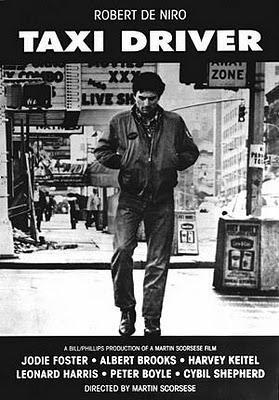 Martin Scorsese's Taxi Driver (1976) was not expected to be a mainstream success but was a personal project for Scorsese. He took an uncompromising approach in making the film true to the spirit of Paul Schrader's screenplay, that touched a chord in him.
Martin Scorsese's Taxi Driver (1976) was not expected to be a mainstream success but was a personal project for Scorsese. He took an uncompromising approach in making the film true to the spirit of Paul Schrader's screenplay, that touched a chord in him.
Martin Scorsese: "I had to make that movie. Not so much because of the social statement it makes, but because of its feeling about things, including things I don’t like to admit to myself." "I know this guy Travis. I've had the feelings he has, and those feelings have to be explored, taken out and examined. I know the feeling of rejection that Travis feels, of not being able to make relationships survive. I know the killing feeling, the feeling of really being angry." [8]
The film draws from different genre elements. Frank Rich: "Imagine Hitchcock’s Psycho told from the point of view of its title character, and you have a rough idea of Taxi Driver. This riveting 1976 film is at once a thriller, a psychological case study, an exploration of the eroticism of violence, a political commentary and a horror melodrama of seamy New York." [6]
Taxi Driver fits into Film-noir, a filmic style that was popular in the 1940's/50's Post-WWII era. The German Expressionism and Realism influenced mise-en-scène (visual composition) of noir is characterized by harsh low-key black & white lighting, deep shadows, ominous musical score, claustrophobic camera-work, unusual low and wide camera-angles. They dealt with themes of corruption, crime, moral ambiguity and explored the dark side of American Dream. The mood of these films presented a pessimistic world-view, reflective of the times Post-War disillusionment. Often times, Raymond Chandler-esque hard boiled narration is implemented. Martin Scorsese: "If Taxi Driver comes out of any genre at all. It's kind of a noir in a way, that was intentional. That had a strong effect on me, those pictures" [1]
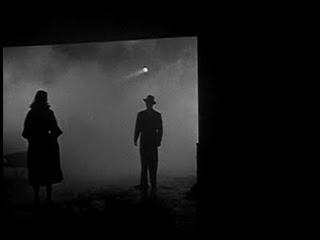
At the time of the film, everyone was in disillusionment as it was Post-Vietnam, the Watergate scandal and political assassinations. The optimistic peace & love idealism of the 1960's had come to an end. It was only fitting that Scorsese opted for a Film-noir approach.
Guy Flatley: "But doesn't Taxi Driver make a broader social statement? Doesn't it say that our country with it's poverty and filth, it's Watergate and it's Vietnam breeds drifting creatures like Travis, people who can gain recognition only through acts of violence? Surely, the fact that he is a Vietnam veteran is not coincidental?"
Martin Scorsese: "That's all in the movie, and I agree that changes should be made in the American social structure. But in order to bring about social change, you have to start by understanding individual characters. You begin by going into a microcosm. The best way is to start with a character and then put him through scenes, through conflicts, that illustrate your theme. Then the character grows, in a positive or negative way. I always start with a person, not a statement." [8]
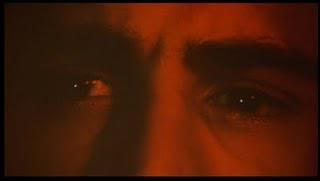
The film has a subjective narrative point-of-view that plunges you within the mind of Travis Bickle, played by Robert De Niro. The narration and Scorsese's camera-work provides an insight into his thoughts, feelings and psychological issues. You identify with the character, regardless of how flawed and morally ambiguous he is.
Travis was an ex-marine that got honorably discharged in 1973, the charred Viet-Cong flag in his room implies that he fought in the Vietnam War and currently works as a night shift taxi driver. He has developed Post-Traumatic Stress Disorder which manifested as a result of War-trauma that lead to symptoms of insomnia, the very reason he opted for night shifts. There's no sense of meaning or purpose in his life, therefore he is disoriented and socially alienated.
Travis Bickle: "All my life needed was a sense of direction, a sense of someplace to go. I do not believe one should devote his life to morbid self-attention, but should become a person like other people" (Taxi Driver Screenplay)
The passengers of Travis' taxi are often low-lifes, criminals and pimps, however he has a misanthropic view of such a seedy and corrupt society. As he slowly descents into madness, he obsessively fantasizes about exterminating such filth. When he's taking pills during night shifts to keep awake, he becomes increasingly delusional, that causes his sense of reality to warp.
Martin Scorsese: "The hallucinatory idea is definitely a point of view, when a person crosses the line between fantasy and reality. The Fantasy is as real as the reality, it's real, the dream's real, the paranoia is real; people may not being doing anything against you but you think they are."
"That's probably what I was getting at in talking about hallucinatory. Drug-induced. He drinks a bit, he takes some pills to keep awake, he's young enough in the sense that his body is strong. It does change our perception; particularly working at night and if you take pills to keep you awake."
"It creates a kind of strange subterranean, that I experienced, opens a strange world to you. Images, shadows lurking but I'm also an urban person. I see things that way but if you keep pushing it at night, without drugs, it does something to a person."
"Especially driving in the streets and not knowing who's going to get into your car and when that person gets into your car, that person controls your life in the next 10-20 minutes. That's very dangerous. He's living on the edge. So naturally things begin to take on a different meaning to him especially 4:30 in the morning" [1]
In the end, after his violent actions, it's not clear whether he has achieved redemption or a catharsis. His media recognition is very ironic, considering his intentions are morally questionable.
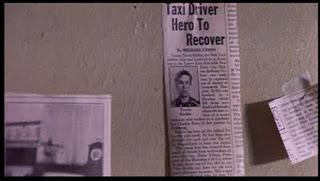
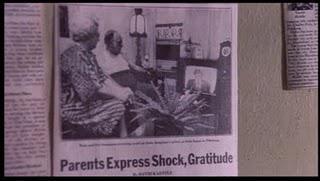
Martin Scorsese: "This guy crosses the line. The beauty in what Schrader did in the script and the nature of why he is this way, you don't know" [2]
In the final scene, Travis is seen staring at a mysterious glowing light in the rear-view mirror. Vaguely implying his descent into madness.
Martin Scorsese: "I had him look in the mirror again as if he just saw something happen. I wanted to get the impression that the time-bomb is beginning to tick again and it's going to happen again" [2]
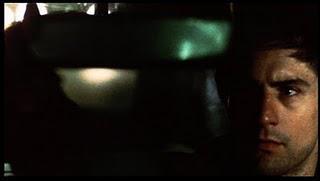
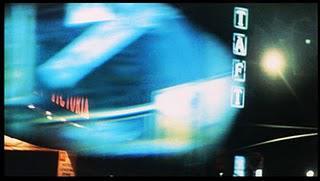
Roger Ebert: "There has been much discussion about the ending, in which we see newspaper clippings about Travis' "heroism," and then Betsy gets into his cab and seems to give him admiration instead of her earlier disgust. Is this a fantasy scene? Did Travis survive the shoot-out? Are we experiencing his dying thoughts? Can the sequence be accepted as literally true?"
"I am not sure there can be an answer to these questions. The end sequence plays like music, not drama: It completes the story on an emotional, not a literal, level. We end not on carnage but on redemption, which is the goal of so many of Scorsese's characters" [3]
Visual Style
Everything is projected from Travis' subjective point-of-view, heightening his misanthropic view to an expressive effect. In particular, his view of criminals, pimps, low-life's and prostitutes.
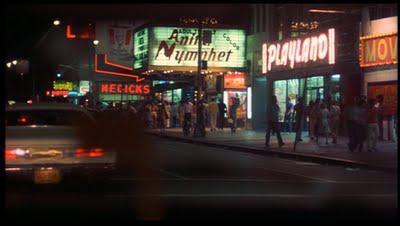
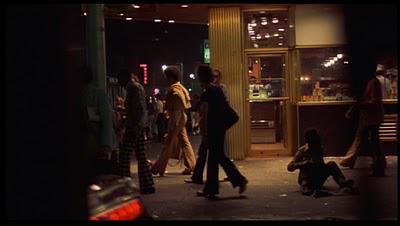
Martin Scorsese is known for realism but often he uses formalist filmmaking techniques to present his films in a subjective manner.
David Bordwell: "We see the real New York, but filtered through the eyes of a man who considers it an open sewer. The plot will soon lock us into his consciousness more explicitly, through restricted point of view and voice-over diary extracts and crisp montages of the cruising cab."
"In addition, the motifs introduced here, particularly purifying water and blips of light, will become elaborated in the course of the movie. The general point, however, is that Scorsese has updated Impressionist and Expressionist tactics in order to reveal a man’s mind through images." [7]
The close-up shot of Alka-Seltzer fizzing in a glass of water represents Travis' own paranoia and psychological state.
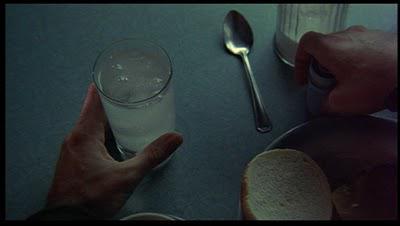
The scene where Travis is talking to Betsy on the phone, the camera pulls back as though the conversation is too pathetic to bear.
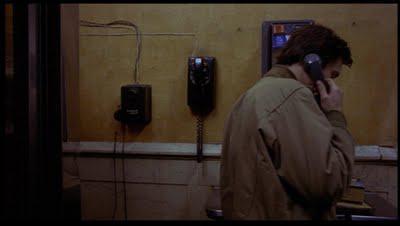
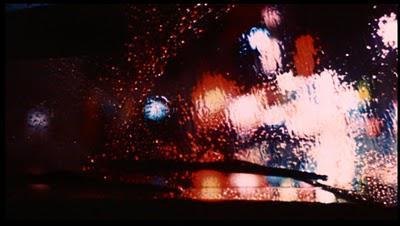
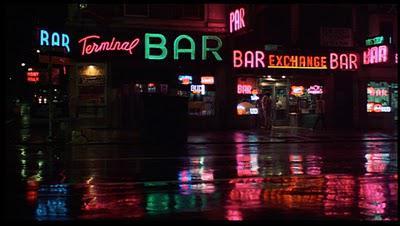
Influences Taxi Driver has parallels to John Ford's The Searchers (1956). Carrie Gorringe: "There is the similarity in theme and iconography between Taxi Driver and the western film of the 50s, most notably in its depiction of violent revenge as a means of personal redemption. One western in particular comes immediately to mind, one which has often been cited by Scorsese." "It is striking how many similarities exist between this work and John Ford's 1956 western The Searchers (and it is very difficult to comprehend the deeper psychological significance of Scorsese's Who's That Knocking At My Door? (1968), without any knowledge of The Searchers; all of J.R.'s discomfort with women is reflected in his constant references to the film) Both of them have as central subtexts the use of violence by a war veteran in an attempt to restore order, both to their society and, by extension, to their own lives."
"'Ford's Ethan Edwards (John Wayne) is desperate to regain his niece Debbie, (Natalie Wood), who has been kidnapped by Indians, as much to reassure himself that the sacrifice of self necessitated by the Civil War assured the continuance of traditions that he held dear, as it was to ensure a woman's putative virtue (in fact, the latter is often defined in middle-class society as synonymous with the former)."
"He is moved to homicidal feelings precisely because Debbie's refusal to return to "normal" society is a violation of his values. Although he spares her life, and does achieve a form of catharsis (although nothing like what Travis is able to achieve), Ethan decides to leave a society that he is powerless to change, and that he has no interest in reforming"[4]
Travis views himself as God's Lonely Man, this is a reference to an existential essay by writer Thomas Wolfe. Thomas Wolfe: "The whole conviction of my life now rests upon the belief that loneliness, far from being a rare and curious phenomenon, is the central and inevitable fact of human existence" (God's Lonely Man) [5] Travis Bickle: "The life of loneliness pursues me wherever I go: in bars, cars, coffee shops, theaters, stores, sidewalks. There is no escape. I am God's lonely man" (Taxi Driver Screenplay)
Paul Schrader and Martin Scorsese looked for inspiration from existential works such as La Nausee by Jean Paul Sartre and Notes From Underground by Fyodor Dostoyevsky.
Carrie Gorringe: "The script for Taxi Driver came about as a result of screenwriter Schrader's own sense of personal alienation during the 1970s."
"Spending his time in extracurricular pursuits similar to those of Travis, Schrader's choice of reading material was a compliment to his state of mind: he read the diary of Arthur Bremer, who tried to assassinate Alabama Governor George Wallace in 1972, as well as Sartre's La Nausee.""For his part, Scorsese contributed his own interpretation of Dostoevsky's Notes From Underground to the mix. So, the existential mode of Taxi Driver was relevant to all who saw it, mentally balanced or otherwise, and it seemed at times as if the latter category was gaining in influence" [4] The sense of claustrophobia in the camera-work of Taxi Driver is influenced by Alfred Hitchcock's The Wrong Man (1956).
Martin Scorsese: "The Wrong Man which I keep referencing a lot, for other people to see in terms of it's sense of camera movement, the sense of guilt and paranoia" [1]
The flat head-on and tableau-esque camera angles are influenced by Jack Hazan's A Bigger Splash (1973).
Martin Scorsese: "A Bigger Splash, by Jack Hazan, was an interesting film. That led to certain angles that were interesting, which became very flat, head-on angles."
"For example one I referenced where he drops somebody at a hotel and shot pretty much head-on flat, which relates directly to this shot which is Travis's car in front of the grocery store before he commits his first murder."
"So the linking up the sense that the camera being away from the action and just presenting it like a tableau." [1]
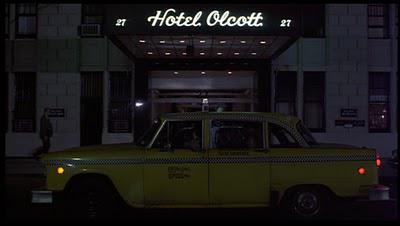
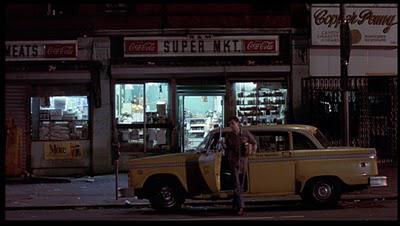
Martin Scorsese: "Schrader had a sense of the ending like Samurai Rebellion by Kobayashi where it's just a explosion of violence and the sacrificial blood is splashed all over the walls" [2]
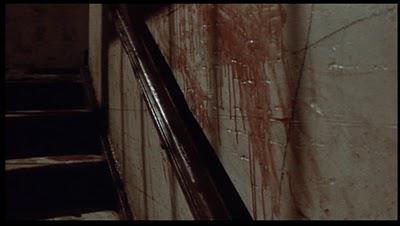
Citations 1. Martin Scorsese on Taxi Driver Taxi Driver 2-Disc DVD.
2. Scorsese on Scorsese: Documentary The Departed 2-Disc DVD.
3. Ebert's Review of Taxi Driver rogerebert.com January 1st 2004.
4. Gorringe, Carrie. Taxi Driver nitrateonline.com 1995.
5. Ruggiero, Tim. An Existential View Of Loneliness philosophicalsociety.com September 11th 2001.
6. Rich, Frank. Taxi Driver: From the Current September 24th 1990.
7. Bordwell, David. Scorsese, ‘pressionist April 21st 2010
8. Martin Scorsese: Interviews January 1st 1999
